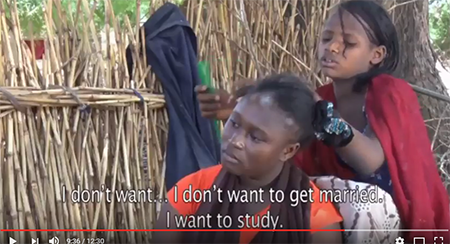E2A releases three films to spark dialogue, reflection, and action for improving young people’s sexual and reproductive health in Niger
 Over the past two years, E2A has released three films that are being used as part of a comprehensive approach to behavior change implemented by the project’s University Leadership for Change initiative. The films demonstrate how narrative can be used in an effort to change sexual and reproductive health behaviors by sparking reflection, dialogue, and action.
Over the past two years, E2A has released three films that are being used as part of a comprehensive approach to behavior change implemented by the project’s University Leadership for Change initiative. The films demonstrate how narrative can be used in an effort to change sexual and reproductive health behaviors by sparking reflection, dialogue, and action.
The films were produced by local Nigerien film companies Maggia and B@k Techno and were based on qualitative data collected from young people, service providers, and rural communities. The first two films are in French with English subtitles. The third film, Hadjo’s Dreams, is in Haousa, with English or French subtitles.
The narrative in the first film, Binta’s Dilemma, presents how university students in Niger confront culturally controversial topics, including contraception, unintended pregnancy, and the societal pressures on young women to bear children once they are married. It is meant to help young people, especially students, reflect on and react to these topics.
The second film, Whose Norms, focuses on the barriers young people face from service providers and the barriers that service providers confront when offering contraceptive services to young people. It seeks to help service providers in Niger offer quality youth-friendly sexual and reproductive health services.
The third film, Hadjo’s Dreams, highlights the issue of child marriage. It aims to encourage reflection by communities about ways that child marriage can be prevented and how the sexual and reproductive health of adolescent girls can be improved. To view the film with French subtitles, click here.
More about University Leadership for Change
In Niger, rates of childbearing, child marriage, and adolescent pregnancy are some of the highest in the world. University Leadership for Change engages students, the administration, and university health services from Abdou Moumouni University in Niamey, as well as the ministries of health and higher education to tackle pervasive challenges to improving young people’s sexual and reproductive health. Student peer leaders facilitate behavior-change activities, which follow Pathfinder International’s Pathways to Change and Reflection and Action for Change (REACH) methodology. These methodologies involve young people, health providers, and community members in identifying and prioritizing behavioral outcomes that can improve health and well-being in their communities. The approach used at Abdou Moumouni and in rural communities where many of the students are from may be scaled up in partnership with the AgirPF Project to universities in three additional Nigerien cities: Tahoua, Maradi, and Zinder.
Media Contact
For more information, please contact us.